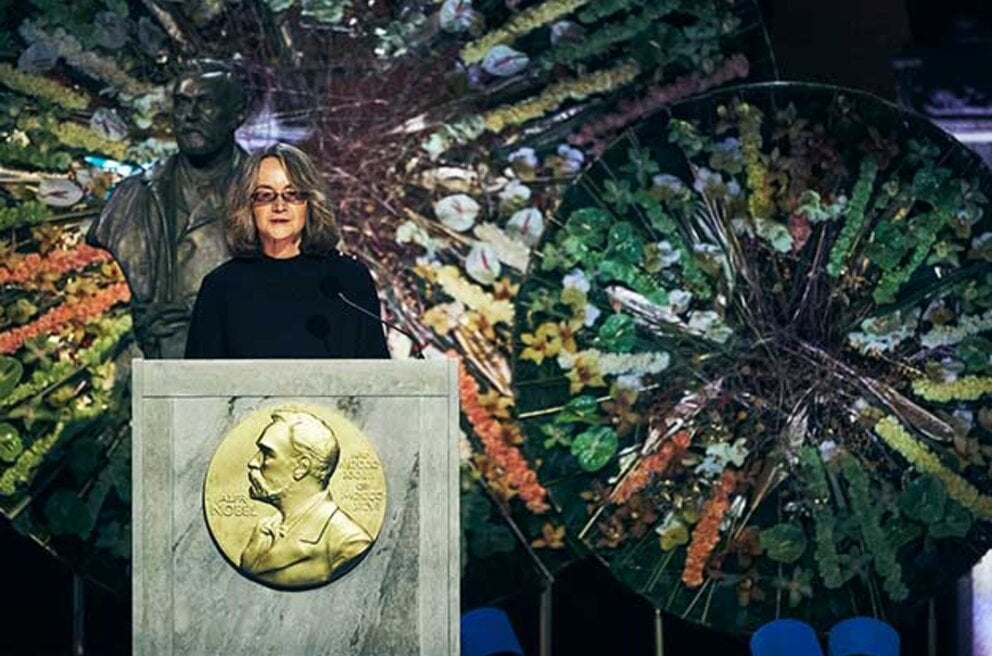Award ceremony speech

Ellen Mattson delivering the presentation speech for the 2021 Nobel Prize in Literature.
© Nobel Prize Outreach. Photo: Dan Lepp
English
Swedish
Presentation Speech by Writer Ellen Mattson, Member of the Swedish Academy, Member of the Nobel Committee for Literature, 10 December 2021.
Your Majesties, Esteemed Nobel Prize laureates, Ladies and Gentlemen
A story is told again and again in Abdulrazak Gurnah’s novels. It concerns a boy who disappears or is kidnapped, sold, taken like Moses from the bulrushes, or is fleeing to save his life. He grows into a young man living where he doesn’t belong, where he is forced to find ways of managing both the sorrow of ruptured contact with the past, and also the shock of encountering a society that is basically hostile. The strategies he tries are irony, withdrawal, silence and lies.
Here, lies equate to literary fiction; along with much else, Gurnah’s writing is about the genesis of writers and how stories emerge as a means of understanding what has happened, but also creating an alternative: an improved or simply different version to offer loved ones and use as a shield against revealing light. But the protection transforms over time into a sickness, a Nessus Tunic that destroys its wearer, and the young man becomes slightly older, then finally an old man fossilised in a life lie, trying to break a silence that has become a wall against the world.
Once upon a time there was a boy, so begins the story. At the dawn of time, which is how all stories begin. The writer’s job is to see that this continues, to defer to it and shepherd it to closure. Only when a story is complete can we understand the meaning of all the episodes, of the mysterious ties that bind, and the deepest sense in the final chord that everything leads up to. Only when it has subsided is the music whole and coherent. It is the story of our time and all others that is told in novels such as Pilgrims Way, Paradise, Afterlives and Desertion. It is about losing one’s place in the world then searching for a new place, resisting slavery even when it appears disguised and in tempting form. To enter Gurnah’s writing is to absorb the great oral narrative tradition’s patterns and mythologies, conflated with the premise of the art of the novel: the uniqueness of every fate. Gurnah describes exile, but never in general terms; he writes not about historical processes but about people subservient to history, their lives shaped by it, but always each in their own way, with preconditions from the distant past ‒ the dawn of time, if you will. As in A Thousand and One Nights, they tell stories to get through the night, and we recognise the voice of the old tale, but the storytellers are modern individuals; they are benificent, snobbish, super-sensitive, cowardly and heroic, as complex and contradictory as in a Shakespeare play or a Joseph Conrad novel. Here, two literary traditions meet and organically merge into a third, something exceptionally beautiful.
Everyone has a dream for their own life and must sustain that dream through challenges along the way. Ultimately, rootlessness is perhaps the only place that can be claimed. It holds those whose lives have been splintered but who have been able to retain within them what is most important and fragile.
Dear Abdulrazak Gurnah, on behalf of the Swedish Academy it is my privilege to convey to you our warmest congratulations on the Nobel Prize in Literature for 2021.
Translated by Kim Loughran
Copyright © The Nobel Foundation 2021
Nobel Prizes and laureates
Six prizes were awarded for achievements that have conferred the greatest benefit to humankind. The 12 laureates' work and discoveries range from proteins' structures and machine learning to fighting for a world free of nuclear weapons.
See them all presented here.
